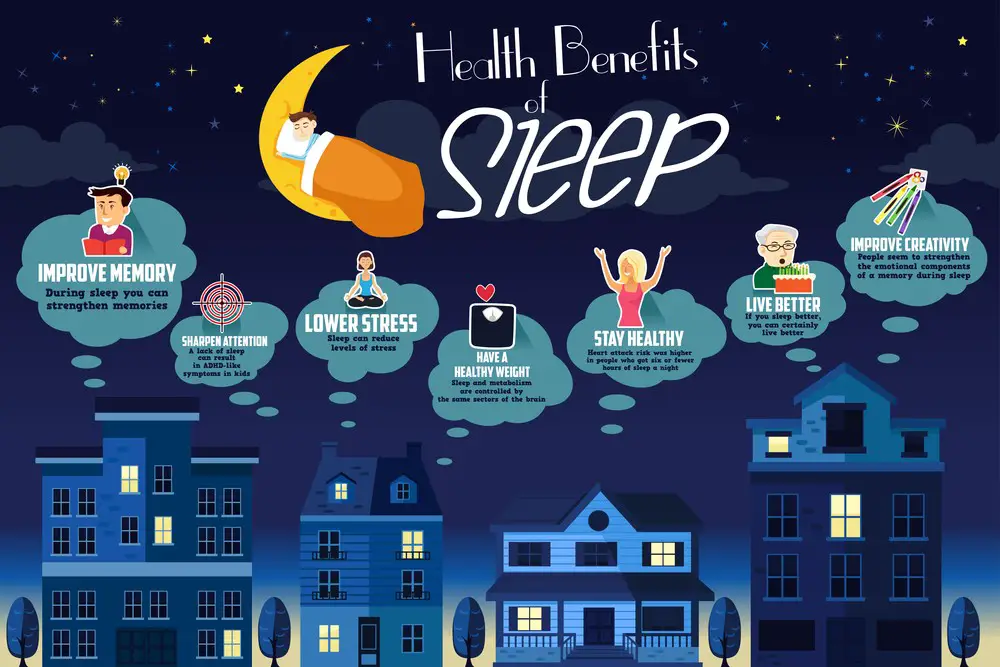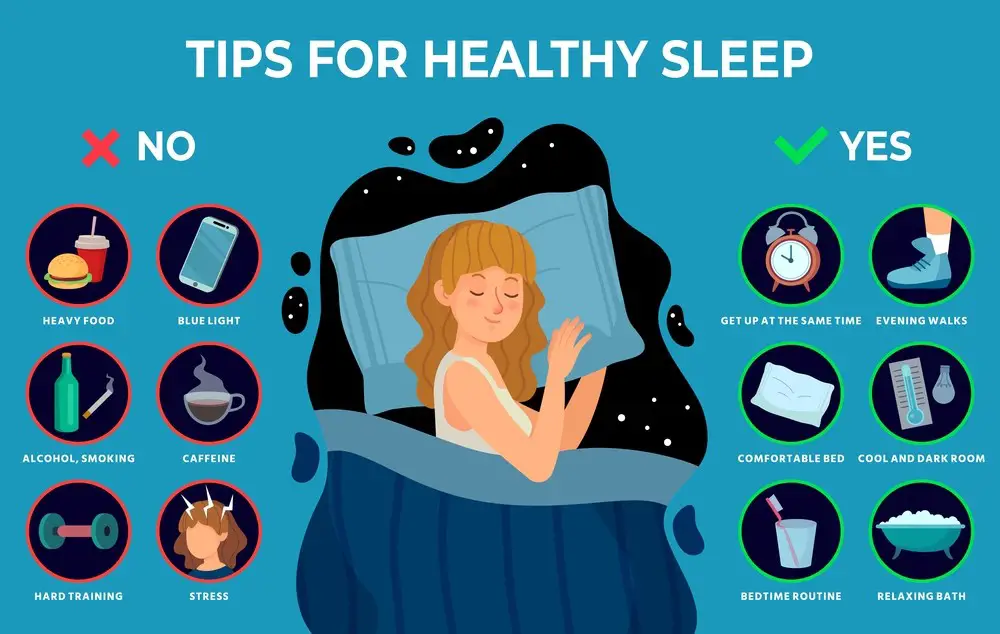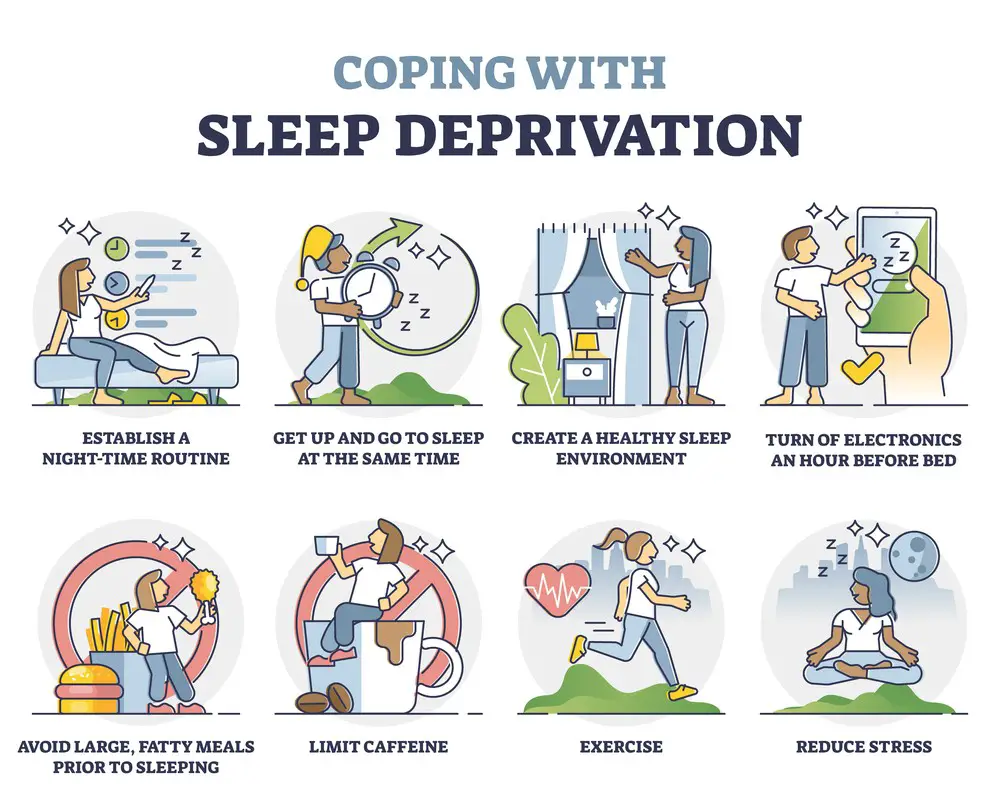Going through a breakup can leave you with a roller coaster of emotions, and one of the most challenging aspects may be the struggle with insomnia. You might find falling or staying asleep nearly impossible, leaving you exhausted and further escalating your emotional turmoil. The connection between mental distress and poor sleep is well-established, but understanding why you can’t sleep and the impact of a breakup and its related emotional strains on the quality and duration of your sleep is essential.
Breakups often bring about sadness, anxiety, anger, and grief, significantly interfering with your ability to fall asleep or get restorative rest. These emotional responses are normal, but if left unaddressed, they can disrupt your sleep patterns and contribute to an unhealthy sleep cycle. Addressing your emotional distress and adjusting to your daily routine and lifestyle may greatly improve your chances of regaining a regular sleep schedule.
Key Takeaways
- Emotional distress from a breakup can disrupt sleep patterns and impact overall mental health
- Addressing emotional pain and developing a healthy routine can help improve sleep quality
- Seeking social support and professional help, if necessary, aid in moving forward and restoring sleep
 Understanding Breakups and Sleep
Understanding Breakups and Sleep
Going through a breakup can be challenging, and it’s entirely normal for it to disrupt your sleep. After a relationship ends, you might experience a range of emotions like sadness, anger, and anxiety. These feelings can directly affect your ability to get a good night’s rest. This section will help you understand how breakups can impact your sleep and offer tips for regaining control over your sleep patterns.
Impact of Breakup on Sleep
When a relationship ends, it’s common to experience stress and emotional turmoil. These emotions can lead to post-breakup or acute insomnia, resulting in sleep disturbances. Here are some ways a breakup may impact your sleep:
- Increased stress: A breakup’s uncertainty and emotional pain can increase your overall stress levels, making it harder to fall asleep or stay asleep throughout the night.
- Intrusive thoughts: Ruminating about the past or worrying about the future post-breakup is common. These thoughts can make it challenging to quiet your mind enough to fall asleep.
- Changed sleep environment: If you previously shared a bed with your partner, adjusting to a new sleeping arrangement can be difficult and might take some time.
Dealing with sleep disturbances can be tough, but there are things you can do to ease insomnia and get better rest. Here are some tips to improve your sleep after a breakup:
- Establish a bedtime routine: A consistent evening ritual that helps you relax and unwind can signal to your body that it’s time for sleep.
- Limit screen time: Try to put away electronic devices at least an hour before bed, as the blue light from screens can interfere with your ability to fall asleep.
- Exercise regularly: Physical activity during the day can help reduce stress and improve sleep quality.
- Try relaxation techniques: Deep breathing exercises, meditation, or progressive muscle relaxation can help you de-stress and prepare your body for rest.
Remember that healing from a breakup can take time, and it’s normal for your sleep patterns to be disrupted during this period. By understanding the impact of the breakup on your sleep and implementing these strategies, you can gradually regain control over your sleep routine. Just be patient with yourself and give your body the time it needs to adjust.
 How Emotions Impact Sleep
How Emotions Impact Sleep
We all know how crucial a good night’s sleep is for our well-being. But, dealing with a breakup can throw us off our sleep routine. Let’s dive into how your emotions may impact your sleep quality and explore some strategies to improve it.
Role of Stress Hormones
When you’re going through emotional turmoil, your body tends to release stress hormones, such as cortisol. This hormone keeps you alert and focused, which is great during a crisis but not ideal for bedtime. Elevated cortisol levels can make it difficult to fall asleep and stay asleep. So, it’s essential to find ways to manage your stress:
- Practice relaxation techniques like deep breathing, meditation, or yoga.
- Keep a consistent sleep schedule, even on weekends.
- Prioritize self-care and participate in activities that bring you joy and relaxation.
- Minimize caffeine and alcohol consumption.
Emotional Pain and Sleep
Feelings of depression and anxiety are often experienced after a breakup, and this emotional pain can further disrupt your sleep. The racing thoughts and emotional distress may hinder your ability to fall asleep or cause you to wake up during the night. Here are some tips to help you cope with emotional pain and improve your sleep:
- Create a sleep-friendly environment by keeping your bedroom dark, cool, and comfortable.
- Try journaling to release your feelings and clear your mind before bedtime.
- Engage in physical activity daily to help reduce stress and tire your body.
- Consider speaking to a mental health professional or seeking support from friends and family.
Key takeaway: Managing your emotions and stress during a breakup can significantly impact your sleep quality. Implementing these strategies can help you cope with the emotional pain and create a more conducive environment for restorative sleep.
Addressing Distress
Therapeutic Approaches
If you’re going through a tough time after a breakup and struggling to sleep, you should consider seeking therapy. Professional help will provide you with coping strategies and tools to manage your distress. Many people benefit from talking to a therapist who will listen to you with empathy and help you find solutions.
- Consider Cognitive Behavioral Therapy (CBT) to change negative thought patterns affecting your sleep.
- Try journaling about your emotions and experiences before bedtime to make sense of your feelings.
Remember, seeking help when you’re feeling overwhelmed is perfectly okay.
 Music and Art Therapy
Music and Art Therapy
Creative outlets can be a valuable addition to traditional therapeutic strategies. Engaging your mind through music or art can help calm your thoughts and lead to a more restful sleep. Explore your creativity, and you might find peace in the process.
- Listen to calming music or nature sounds, which can help relax your mind and body.
- Try painting or drawing to express your emotions, even if you aren’t exceptionally skilled in art.
- Experiment with different mediums and styles to determine what works best for you and your current state of mind.
Key takeaway: If sleep is elusive post-breakup, don’t hesitate to explore therapeutic strategies, including professional help and creative outlets. Combining these approaches may help you process your emotions and lead to a more peaceful sleep.
 Importance of Routine and Lifestyle
Importance of Routine and Lifestyle
Regular Sleep Schedule
A regular sleep schedule is crucial for getting back on track after a breakup. Going to bed and waking up consistently helps regulate your body’s internal clock, making it easier to fall asleep and wake up refreshed. Try to:
- Set a bedtime and wake-up time for 7-9 hours of sleep.
- Stick to your sleep schedule on weekends and weekdays.
- Create a relaxing pre-sleep routine, like reading or taking a warm bath.
Diet and Dehydration
What you eat and drink plays a significant role in your sleep quality. A well-balanced diet and staying hydrated can help improve your sleep and overall well-being. Here are some tips:
- Eat balanced meals: Ensure your meals include protein, complex carbs, and healthy fats.
- Avoid heavy meals before bedtime: Give yourself at least 2-3 hours to digest before sleeping.
- Stay hydrated: Drink plenty of water throughout the day, but reduce intake 1-2 hours before bed to minimize nighttime bathroom trips.
Key Takeaway: Establishing healthy routines involving sleep schedules and maintaining a balanced diet can significantly impact your sleep quality and emotional recovery after a breakup. Stick to these practices to build a strong foundation for moving forward.
 Physical and Mental Health Care
Physical and Mental Health Care
Taking care of your physical and mental health is crucial when struggling to sleep after a breakup. Let’s explore some ways to help you get back on track.
Exercise and Sleep
Engaging in regular exercise can have a significant impact on your sleep quality. It’s an excellent way to release endorphins, which improve your mood and decrease stress levels. Consider adding activities like running, yoga, or any exercise you enjoy to your daily routine. Mixing it up can help keep it interesting:
- Morning jogging: kick-start your day and boost your energy levels
- Yoga in the evening: wind down your day with some calming and relaxing stretches
- Group exercises: if you prefer social interactions, join a gym or local class
Consistency is key, but listen to your body and don’t overexert yourself!
Meditation and Breathing Techniques
Meditation and breathing exercises are powerful tools for your mental health, helping you stay present, focused, and aware of your emotions:
- Try guided meditation for 10-15 minutes a day, allowing yourself to acknowledge and process your feelings
- Practice deep breathing techniques to help calm your mind and induce relaxation before bedtime
Try these strategies to improve your physical and mental health while dealing with sleep issues post-breakup. You can re-establish healthy sleeping patterns and become a better version of yourself in the process!
 Avoiding Unhealthy Coping Mechanisms
Avoiding Unhealthy Coping Mechanisms
Awareness of the importance of avoiding unhealthy coping mechanisms after a breakup is essential. These might seem like temporary fixes, but they could lead to more significant problems in the long run.
One common coping mechanism is alcohol. You might feel tempted to drown your sorrows but remember, it’s only a temporary escape. Alcohol can make it harder for you to sleep and can contribute to feelings of depression and anxiety. Instead, try turning to healthier alternatives, like herbal teas or non-alcoholic mocktails. These can help you relax without the negative side effects of alcohol.
Another coping mechanism to avoid is unhealthy food. You might crave comfort food (we all do), but consuming excessive amounts of sugary or fatty foods can hurt your body and mood. Instead of giving in to these cravings, treat yourself to a balanced meal filled with fresh fruits, veggies, lean protein, and whole grains. Keeping your body and mind nourished will help you bounce back from a breakup faster and sleep better.
Here’s a summary of what to avoid and the healthier alternatives:
- Alcohol: Opt for herbal teas or non-alcoholic beverages.
- Unhealthy food: Enjoy balanced meals and nourish your body with healthy options.
In conclusion, remember that taking care of your physical and mental health after a breakup is crucial. By avoiding unhealthy coping mechanisms like excessive alcohol and unhealthy food, you can encourage better sleep and recovery. Embrace the healing process, and know you’ll become stronger on the other end.
Support System and Social Connections
Experiencing a breakup often leaves you with sleepless nights. One effective method to restore your sleep pattern and promote well-being is leaning on your support system and nurturing social connections. Here are some practical ways to do that:
Rely on your friends: Your friends truly care about your emotional and mental health. Sharing your thoughts and feelings with them can be a great relief and might help you gain a new perspective. Spending quality time with friends can distract you from negative thoughts and elevate your mood.
Stay connected: Strengthening your social circle and meeting new people can increase your chances of forming healthy relationships. This can be achieved through joining clubs, classes, or online communities that interest you. Engaging in social activities will occupy your mind, easing the painful memories.
Seek support groups: Find local or online support groups focusing on breakups and relationship issues. These groups can provide valuable insights and coping strategies from individuals who have gone through similar experiences.
Take part in healthy activities: Participate in activities you enjoy, like sports, art, or cooking, in a group setting. These activities will help create social connections and release endorphins, making you feel good and promoting a sense of belonging.
Offer a helping hand: Volunteering and assisting others in need can create strong social bonds and a sense of self-worth, which is crucial while healing from a breakup. Acts of kindness promote feelings of happiness, thus improving your emotional health and sleep quality.
Incorporating these tips into your life will not only help rebuild your support system and social connections but also work toward improving your sleep quality after a breakup. Remember, maintaining a solid support network is a key ingredient in dealing with post-breakup insomnia.

Professional Help and Counseling
Sometimes, coping with a breakup can be overwhelming, and you may struggle to sleep. It’s normal to have a hard time after a breakup, but if you’re finding it difficult to function and sleep, don’t hesitate to seek professional help. Here are a few suggestions to help you out:
Reach out to a therapist or counselor: Talking to a professional can help you navigate your feelings and overcome insomnia related to your breakup. A therapist can offer strategies, techniques, and tailored advice to help you manage your emotions and improve your sleep patterns.
Visit your doctor: If you’re consistently struggling with sleep, it’s important to consult with your doctor. They can rule out any underlying health issues and provide you with resources to aid in improving your sleep.
- Sleep aids: Your doctor may recommend temporary use of sleep aids to help you get the rest you need. Remember to follow their guidelines and use these medications responsibly.
- Lifestyle changes: A doctor can suggest various lifestyle changes to help improve your sleep, such as regular exercise, proper nutrition, and establishing a nighttime routine.
Remember that everyone has their journey when it comes to healing from breakups. Seeking professional help is not a sign of weakness but rather a proactive step towards recovery and better sleep. Below are some signs you need help.
 Recognizing the Call for Mental Wellness
Recognizing the Call for Mental Wellness
Facing a breakup is a tumultuous journey, often leaving ripples across various facets of life, including mental health. Acknowledging and addressing any lingering emotional distress is pivotal to fostering healing and ensuring a wholesome life. Below are signs indicating that seeking mental health support could be a beneficial step:
- Persistent Sadness or Despondency:
- If melancholy clouds your days, making joy a rare visitor, it’s a sign.
- Anxiety that Doesn’t Dissipate:
- A constant, unsettling nervousness or fear could indicate anxiety issues.
- Sleep Disturbances:
- Struggling with insomnia or constantly disrupted sleep post-breakup is a flag.
- Changes in Appetite or Weight:
- Significant fluctuations might reflect emotional distress.
- Withdrawal from Loved Ones or Activities:
- If social gatherings or hobbies no longer appeal, it might signal a problem.
- Anger or Irritability:
- Uncharacteristic outbursts or irritation could be a cry for help.
- Feelings of Hopelessness:
- If future days seem bleak, it’s crucial to seek support.
- Physical Symptoms without a Clear Cause:
- Unexplained aches or fatigue can be manifestations of mental distress.
- Difficulty Concentrating:
- If focusing becomes a hurdle, it might be time to seek guidance.
- Engaging in Risky Behaviors:
- This could be a way of coping or escaping from emotional pain.
 Moving Forward
Moving Forward
Rediscovering Joy
After a breakup, it’s natural to feel a sense of loss, but it’s important not to forget that life goes on. To heal, you need to rediscover the joy in your life. Focus on the following:
- Surround yourself with positivity: Surround yourself with friends and family who uplift and encourage you. They will remind you of the good times and bring fresh air.
- Practice self-care: Take care of your physical, mental, and emotional well-being. Establish a routine incorporating exercise, healthy eating, and mindfulness practices, like meditation or journaling.
Career and Hobby Focus
Focusing on your career and hobbies can help you find a renewed purpose and fulfillment. Remember, you have the power to shape your future, and now is the perfect time to invest in yourself:
- Develop a career path: Reflect on your professional goals and what steps you can take to further your career. Identify areas where you can develop or improve new skills through continued education or certifications.
- Pursue new hobbies and interests: Pick up a new pastime or rekindle your love for an existing one. Hobbies offer a rewarding way to spend time and can open up new social circles to help you make new connections.
Remember, healing doesn’t happen overnight, but focusing on rediscovering joy and investing in career and hobby development can provide a solid foundation to support your personal growth and self-exploration journey. Keep moving forward one step at a time, and you’ll emerge stronger and more fulfilled.
Frequently Asked Questions
 Why is it so hard to sleep after a breakup?
Why is it so hard to sleep after a breakup?
Sleeping after a breakup is challenging because your mind is likely flooded with emotions and memories. The absence of your ex-partner can cause feelings of sadness, anxiety, and even bitterness, which might keep you up at night. Remember that this is a normal part of the healing process, and it’s essential to allow yourself the time and space to process these emotions.
How long does insomnia last after a breakup?
The duration of insomnia after a breakup varies significantly from person to person. Generally, it might last anywhere from a few days to several weeks, depending on the relationship’s intensity and your personal coping mechanisms. Be patient with yourself and know that, over time, your sleep should gradually return to normal.
How can I improve my sleep after a breakup?
To improve your sleep after a breakup, try implementing the following strategies:
- Maintain a consistent sleep schedule, going to bed and waking up at the same time daily.
- Create a relaxing bedtime routine, such as taking a warm bath, reading, or practicing deep breathing exercises.
- Keep your bedroom environment comfortable, cool, and free of distractions.
- Limit exposure to screens at least an hour before bedtime.
- Exercise regularly, but avoid doing so close to bedtime.
- Avoid caffeine, alcohol, and heavy meals in the evening.
Do breakups cause sleep disturbances?
Yes, breakups can cause sleep disturbances. The emotional stress and sadness experienced during this difficult time can result in insomnia and other sleep issues. It’s important to recognize this potential consequence and work on finding ways to cope with the emotional pain and improve sleep quality.
How to cope with sleeping alone after a breakup?
Coping with sleeping alone after a breakup can be tough, but there are ways to make it more bearable:
- Surround yourself with comforting items, like soft blankets or cherished mementoes.
- Try using white noise or calming sounds to help you relax.
- Consider adopting a calming bedtime routine to ease the transition.
- Reach out to friends or a support group to talk about your feelings.
- If you’re still struggling after some time, consider seeking professional help.
Why do I sleep too much after a break up?
Sleeping too much after a breakup might be your body’s response to the emotional stress you’re experiencing. It can be seen as a coping mechanism, providing an escape from the pain and overwhelming thoughts. If you feel like you’re sleeping excessively, try to address the root of the problem – your emotional state – by engaging in activities that promote healing, such as exercise, journaling, or talking to a therapist.
About Jacob Maslow
After surviving the traumatizing events of 9/11, I took it upon myself to heal through helping others. I’m the primary caregiver of my children and understand from first-hand experience the lonely paths you have to walk as a partner and parent when leaving an unhealthy relationship.
We’re all echoing in a dark space that doesn’t have to be this empty, and that’s been my mission since finding solace and recovery in therapy: To help comfort others who are still in shock and at the prime of their struggle.
I came across BetterHelp after searching for this type of community. I wanted to belong to a body of proactive therapists and supportive therapy veterans that allowed me to see other sides of the story.
It was unconventional, and that’s what attracted me most. During my most challenging times, when my ex-wife completely cut me off from my children, I found comfort and clarity through BetterHelp.
Instead of being chained to a strict therapist recommendation, I was in charge of who I felt understood my struggle most. That allowed me to find my true peace, as I was reunited with those who read behind my words and had first-hand experience with my trauma.
Recovery is a choice; with BetterHelp, that choice will be a few clicks away. You can join their couples-oriented platform, Regain.us, for those stuck with family estrangement and toxic relationship patterns.
- The Burnout Epidemic: Why We’re All Feeling Overwhelmed and How to Cope - February 9, 2024
- How to Live a Peaceful Life - February 9, 2024
- Useful Information You Should Know About Health Screenings - February 8, 2024
This site contains affiliate links to products. We will receive a commission for purchases made through these links.


 Understanding Breakups and Sleep
Understanding Breakups and Sleep How Emotions Impact Sleep
How Emotions Impact Sleep Music and Art Therapy
Music and Art Therapy Importance of Routine and Lifestyle
Importance of Routine and Lifestyle Physical and Mental Health Care
Physical and Mental Health Care Avoiding Unhealthy Coping Mechanisms
Avoiding Unhealthy Coping Mechanisms Recognizing the Call for Mental Wellness
Recognizing the Call for Mental Wellness Moving Forward
Moving Forward Why is it so hard to sleep after a breakup?
Why is it so hard to sleep after a breakup?
